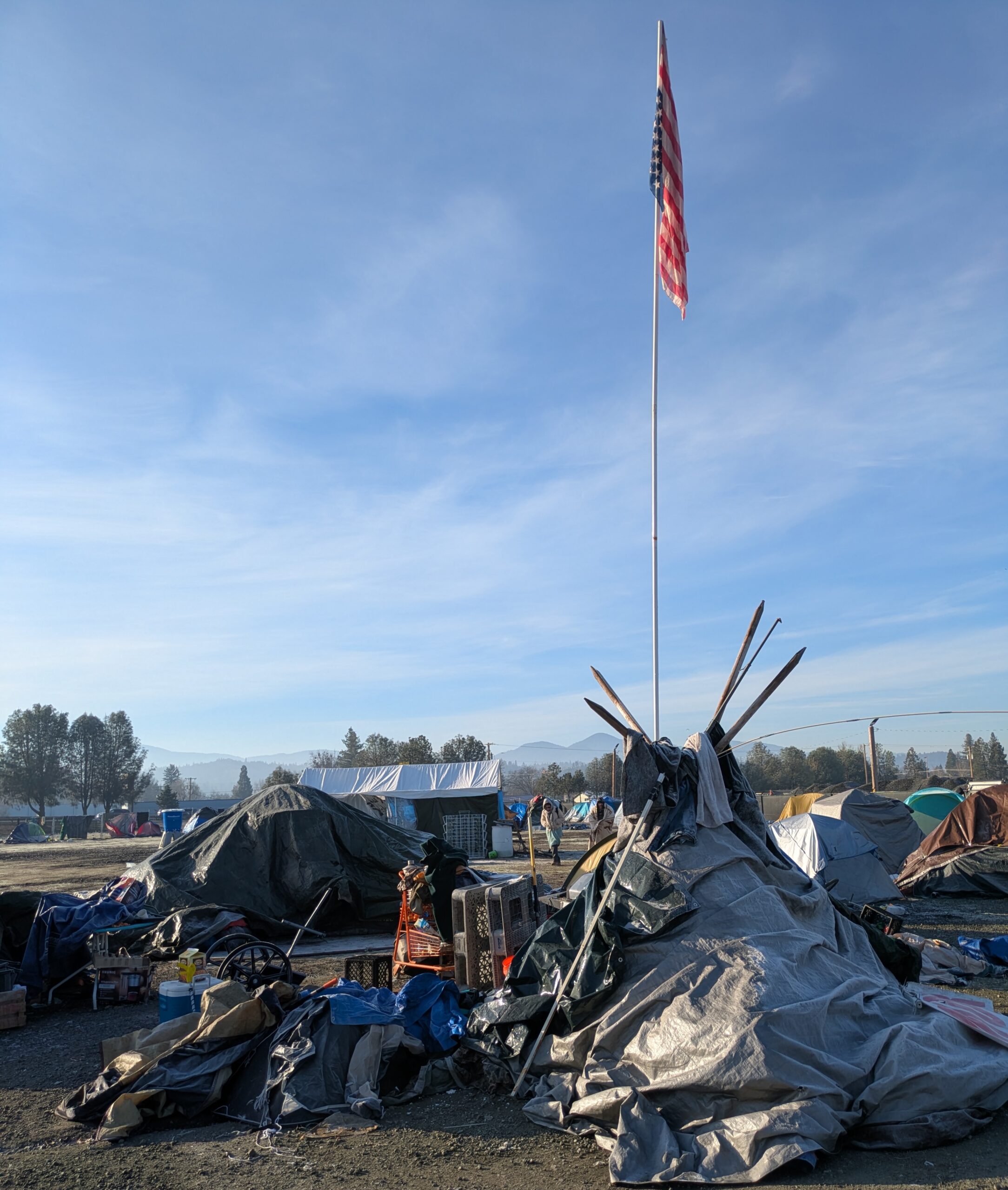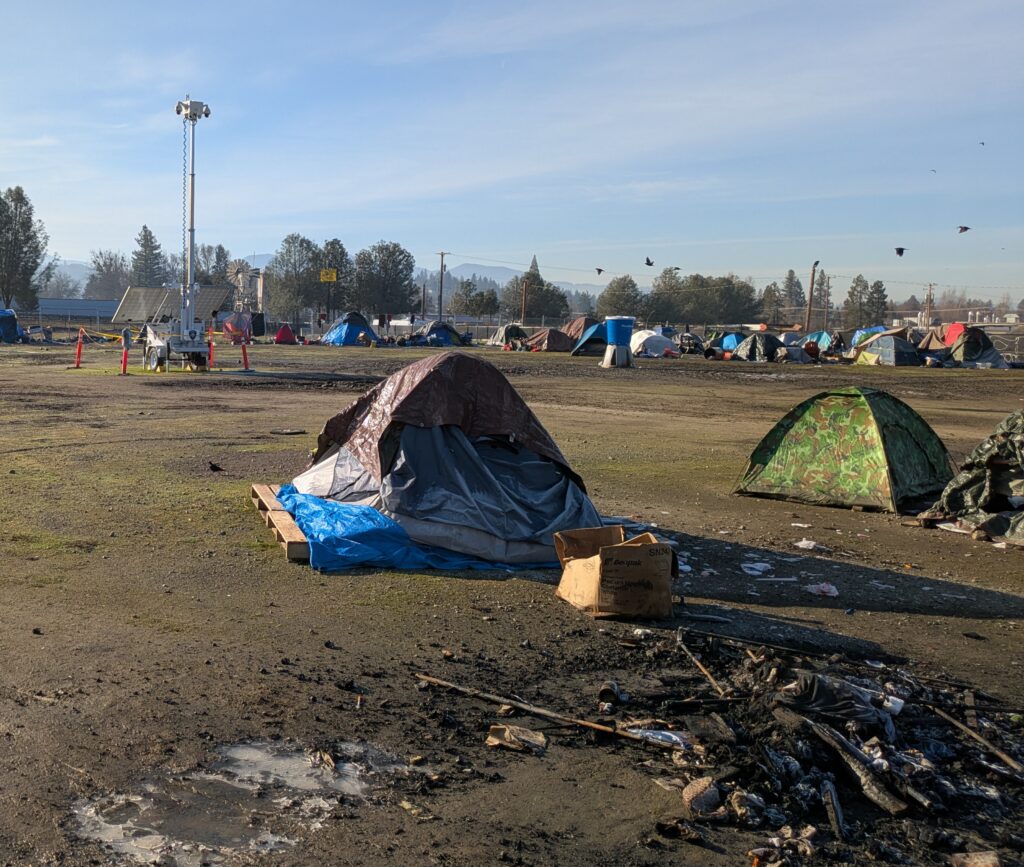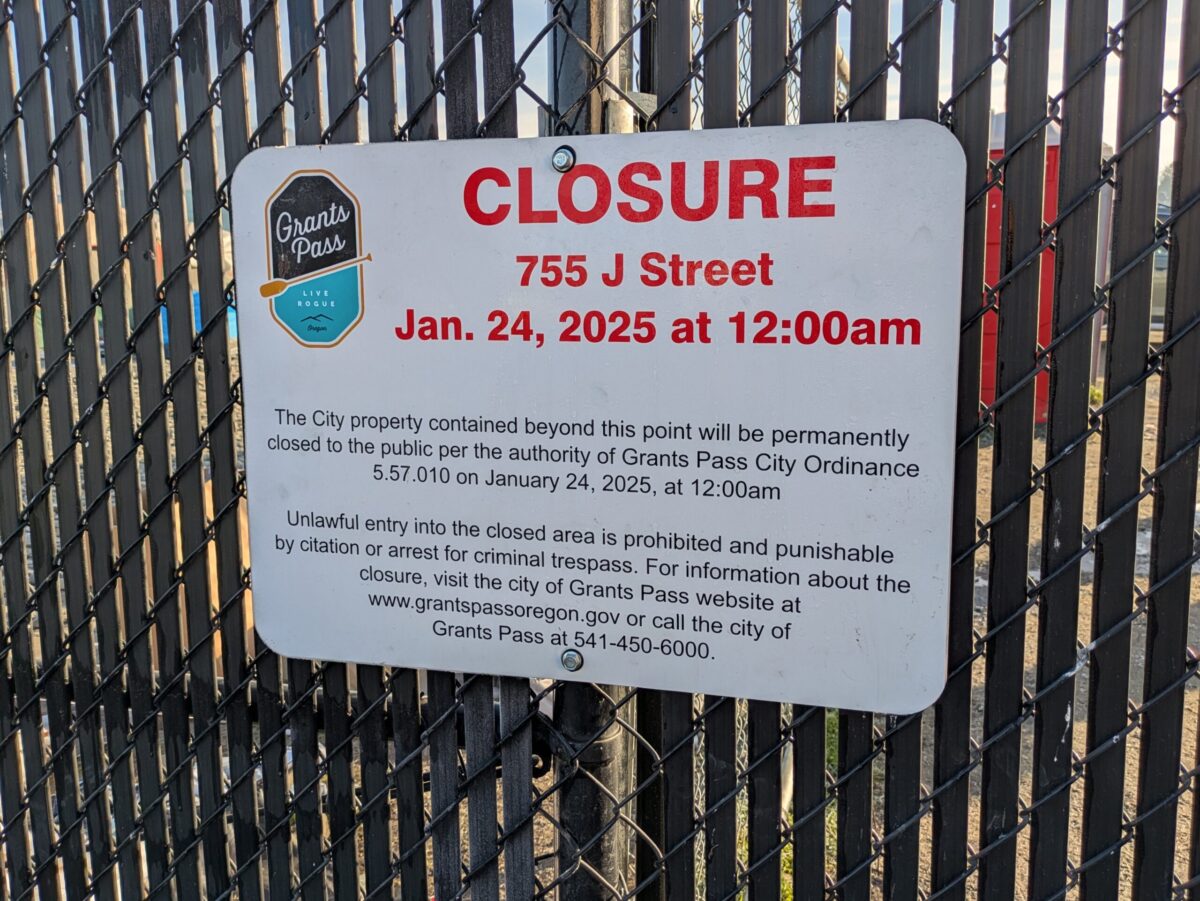Late Thursday night, the city behind last year’s Supreme Court ruling that inspired dozens of local camping bans will effectively outlaw camping during the day.
This week, Grants Pass, Oregon is scaling back its five-month-old campsite program originally intended to quickly move unsheltered people out of the city’s parks. With the support of four newly elected councilors, the Grants Pass City Council voted two weeks ago to close one of the city’s two campsites and end camping during the day at the remaining campground.
The city is shutting down its camp on 755 Southeast J St. late Thursday night—technically, midnight on Friday morning, when most Grants Pass residents will be at home, asleep.
Residents, homeless service providers and volunteers on outreach teams have questioned where unsheltered people will go after the plan is in effect and how the changes will benefit both housed and unhoused people in Grants Pass.
“I see very little evidence of any compassion in some members of the city council,” said David Barbian, a volunteer with the Society of St. Vincent de Paul’s social services team, adding: “The main thing is they should treat the unsheltered people as real people, not like cockroaches.”
Mayor Clint Scherf and the city’s seven councilors didn’t respond to interview requests sent by email.
The requirement that people move daily from the campsite next to the police department on 712 Northeast Seventh St. will replace a rule that people stay no longer than a week at either campsite, forcing people to move from one city camp to the other each week.
Dr. Bruce Murray is chief medical officer for the Mobile Integrative Navigation Team (MINT), which provides a warming shelter and other homeless services in Grants Pass. Last year, he wrote about 25 doctor’s letters for medically fragile people and people with disabilities that said moving from one camp to the other would put their health at risk.

Tuesday was the first day the city required people staying at the Seventh Street campsite to leave by 7 a.m., and Murray was at the lot by that time, when the temperature was in the 20s. Murray said police arrived about 7:45 a.m.
“I said, ‘There are some medically fragile people,’ and they said, ‘We know who they are. We’ll work with you,’ and that was really the tone of the morning,” Murray said.
People scattered throughout the morning, and he said the lot was vacant by 1 p.m. and clean by 1:30 p.m.
Many people staying at the J Street camp aren’t sure where they’ll go when it closes
Mary Elizabeth Donnelly, president of the social services conference for St. Vincent de Paul in Grants Pass, said that for many people leaving the J Street campsite late Thursday night, tearing down their tents and moving their belongings by themselves will be a challenge.
“I don’t know where these people are going to go,” she said. “It’s distressing.”
On Wednesday, Linda Hughes visited the J Street site with Barbian and Sam Kempton-Hein. The volunteers for St. Vincent’s social services program have visited the campsites to provide things like black garbage bags, warm gloves and hygiene products.
“Most of them wanted laundry vouchers, laundry detergent, black bags, safety pins—stuff like that because they’re getting ready to leave,” Hughes said.
Homeless service providers have told Streetlight that camping bans can complicate outreach, pushing unsheltered people away from resources and making it harder to find them to connect them with housing and other services.
[ Read more: Budgets for Grants Pass’ new campsite program show unexplained, runaway costs ]
When the volunteers asked people staying at the camp where they planned to go when it shuts down, some people said they were headed for public land owned by the federal Bureau of Land Management (BLM) or mining claims, land where someone has staked a claim to extract mineral deposits. Many others weren’t sure.
“If everybody’s kind of going to the same place, we can help them,” Hughes said, “but we don’t know exactly where they’re going.”
Kempton-Hein said a lot of people staying at the J Street campsite are hoping an opportunity appears before they have to move.
“The ones who are going out to mining claims or BLM lands tend to be the people that have more personal connections around town, people who can drive trucks to move around their stuff and everything,” he said, “but there’s still a lot of them that really have no idea what they’re going to do.”
“And no way to get there,” Hughes added.
Service providers still don’t see how people from J Street would fit in the city’s other campsite
Homeless advocates, service providers and unsheltered residents have pointed out that the smaller Seventh Street lot can’t hold the same number of people as the J Street campsite.
Murray said during his most recent visits to the campsites, Seventh Street had about 40 tents, while J Street had more than 100.
“That math just doesn’t work,” he said.
The number of people staying at the J Street lot has risen the last few months, Murray said.
“The fallacy was, ‘If we make things so miserable, don’t provide water, shelter, easy access to markets or stores, they will leave,’” he said. “What (the city is) seeing is a total distillation of the homeless population into those who have nowhere to go, and they don’t get that.”

Rescheduled campsite changes with little public notice underscore transparency concerns
During a meeting two weeks ago, councilors voted to close the J Street campsite on Friday, Jan. 10, three days after the meeting. (In most cases, Oregon state law requires police to post a written notice in English and Spanish at least 72 hours before removing people from campsites.)
The Daily Courier reported last week that on the day of the meeting—Tuesday, Jan. 7—people staying at the J Street campsite received notices to leave the camp by 1 p.m. on Friday.
The day after the meeting, Hughes and other St. Vincent volunteers visited the J Street campsite and saw notices on “all the tents,” she said. Unsheltered people told Hughes that a police officer had brought the notices on Tuesday and asked people staying at the J Street camp to hand them out there, she said.
[ Read more: Homeless shelters don’t have enough beds in many communities ]
According to a copy of the notice that the volunteers said police provided to the campsite, police issued it at 1 p.m. on Jan. 7—two hours before the meeting when the city council was scheduled to vote on closing the J Street campsite.
But the next day, people staying there received an update that the campsite would close on Monday, Jan. 20, the Daily Courier reported. Then City Manager Aaron Cubic told the paper last week that Grants Pass had a “proposed date” to close the J Street camp and cut daytime camping at the Seventh Street lot by Friday, Jan. 24. In the meantime, the paper reported, Grants Pass staff would explore the city’s potential liability from the campsite changes.

The shifting dates with minimal public notice of their shifting, aside from signs that went up recently at the campsites and press releases posted after the city had already ended day camping at Seventh Street on Tuesday, echo recent transparency concerns expressed in council meetings, online and conversations with Streetlight. Residents have questioned Scherf and new councilors’ attempt to hold a meeting before they were sworn in and their reversal of city housing policies during a meeting held with 24 hours’ notice in the afternoon, when people working or in class couldn’t attend.
In response to interview requests, Cubic and Grants Pass Police Chief Warren Hensman sent Streetlight the same statement, which the police department posted on Facebook on Tuesday.
The press release said: “Grants Pass police officers communicated the upcoming changes repeatedly over the past two weeks so that those utilizing the resting sites had ample awareness of the resolution. The officers worked to notify the unhoused community of the new rules so that they were prepared in advance.”
Contact Streetlight editor Mollie Bryant at 405-990-0988 or bryant@streetlightnews.org. Follow her reporting by joining our newsletter.
Streetlight is a nonprofit news site based in Oklahoma City. Our mission is to report stories that envision a more equitable world and energize our readers to improve their communities. Donate to support our work here.





This is so sad. How is it that our society has allowed humans to be treated this way. We treat our fur friends better!
Curious to know what “services” are actually being offered to these folks. My brother is homeless in Grants Pass, he’s mentally ill, stopped taking his meds 3 years ago. A judge told him he didn’t have to take his meds if he didn’t want to. So now he’s a danger to himself & has been a victim of crime. He’s 64 years old. Grants Pass PD kept telling me that if he’s a danger to himself, they could get him help, not true, society laws dictate that he can do what he wants, so this is what we allow.